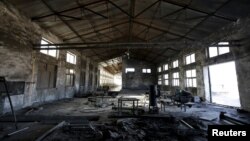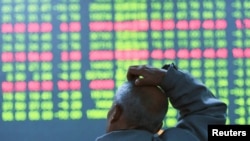In February, China suffered a sharp 20 percent decline in its exports, exacerbating concerns that the country may be dragging down the world economy faster than previously estimated. Economists say they are also worried that China is slowing down its reforms agenda, and focusing too much attention on the immediate need to save jobs and maintain political stability.
The issues top the agenda this week as officials in China hold high level political meetings in Beijing. But despite official candor about the “hard battle” China faces, the focus still appears to be on cautious steps to maintain economic growth, analysts said.
“Their (Chinese leaders’) immediate worry is to shore up the economy in the short run,” said Julian Evans-Pritchard, a China economist with Capital Economics. Because of that, he adds, China is not going for any major restructuring that would lead to significant layoffs and consequent social unrest.
“The government will keep inefficient public companies alive rather than risk job losses,” he said.
Who is dragging whom down?
In a report on Wednesday, the World Bank said slowing growth in China and Asia's emerging economies are driving the slowdown.
China disagrees and in his speech to the National People’s Congress, Premier Li Keqiang argued that that it was declining global growth that is affecting the Chinese economy and not the other way around.
Li pointed out that China continues to be a major contributor to the world economy, and said that there will be no hard landing of the Chinese economy as some experts have predicted. Li said that China’s growth this year is expected to be between 6.5 and seven percent.
His comments were seen as a signal to financial markets, which are nervous about a major downscaling of the Chinese economy.
Hard landing
Some economists note that it is difficult to gauge what amounts to a "hard landing."
“There is no definition for hard landing. I don't know why some people are talking about it. I don't expect the Chinese economy to come down sharply, though the growth will be a little below the target,” said Andrew Batson, China research director for consulting firm Gavekal Dragonomics in Beijing.
Batson did agree, however, with predictions that the government’s policies would enlarge the size of local debt, which is already weighing down the economy. “Government debt is going to increase in 2016 as there is a lot of hidden debt,” he said.
To keep growth going and minimize the impact on society and jobs, Premier Li also announced a $16 billion package for resettling workers who would be unemployed due to the expected closure of certain sunset industries and mines. Observers said that in doing this, the Chinese leader was signaling the Communist Party to prepare for large scale layoffs, which risks serious social unrest.
Reforms slow
Some analysts said the Communist Party’s obsession with controlling every aspect of the economy instead of giving market forces free rein continues to stifle growth.
Domestic and foreign observers have noted that China’s reform efforts are not progressing as fast as many would have hoped. This has impeded efforts by international companies to access the Chinese market, and stunted opportunities for domestic firms as well.
Last year, the financial magazine Caixin analyzed 113 key reforms initiated by the government and found that only 23 were progressing on what it called the "fast lane." Most were moving along slowly, while others had completely stalled.
“China could easily generate faster and healthier growth by reducing barriers to private and foreign investment in services such as healthcare, education, and logistics, and by making the anti-corruption program operate less like a campaign,” said Scott Kennedy, deputy director of the Freeman Chair in China Studies at the Center for Strategic and International Studies. But he added that “they are unlikely to do either.”
China’s trilemma
For their part, Chinese officials said reforms are going forward and they called 2016 the year of intensifying reform implementation.
Even so, concern about China’s reform efforts is spreading and having an impact.
Earlier this week, the global credit ratings agency Moody’s warned that China was trying to take on too much at once, and that it would not succeed to simultaneously restructure the economy, promote growth and ensure stability because of the conflicting efforts needed for them.
The comments about China’s conflicting agendas comes as Moody’s downgraded its outlook on the Chinese economy to negative.
That has triggered a backlash among China’s political elite.
“Moody's and other Western ratings agencies should put into full consideration China's weight and unique economic and political structures before they rush to judgment,” an editorial in the communist party-backed Global Times wrote. “They should research the special role of the Communist Party of China in state governance. This is the kernel of China's system.”
The paper added that the “Western elite should stay humble and open-minded until they really understand China.”
Pansy Yau, deputy chief economist with the Hong Kong Trade Development Council, believes China will be able to achieve structural reforms without suffering negative fallout because its unemployment rate is stable.
“China will implement structural reforms and also make sure there is enough job creation,” she said. Besides, she added, the government will use monetary measures to stimulate the economy to boost growth.







